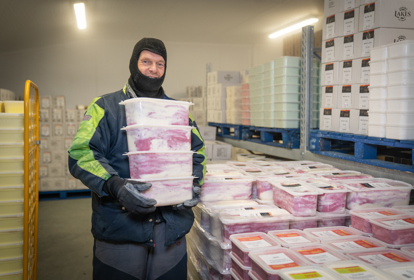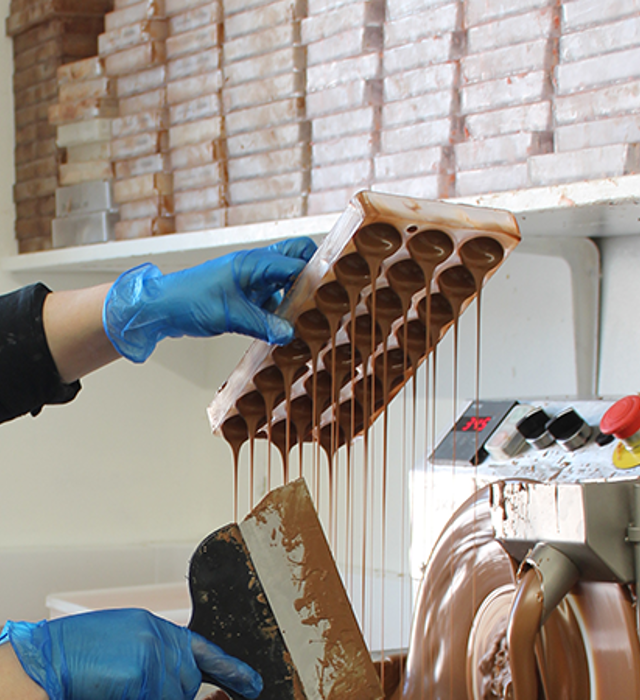
An ice cream manufacturer is transforming its operations by using data and system integration tools, with the support of Made Smarter.
English Lakes Ice Cream (Lakes Ice Cream), based in Kendal, has deployed a bespoke field service management solution that links key business operations: order processing, manufacturing, stock control, sales, distribution and accounting.
The technology has replaced traditional manual, time-consuming and paper-based processes, sped up communications within the business, and freed the small team of 15 employees to focus on more high-value and skilled tasks.
Crucially, the investment has futureproofed Lakes Ice Cream plans to scale up the business.
English Lakes Ice Cream Case StudyWe are delighted with our experience of Made Smarter. From the start Sarah Woodhams and the team have supported our digital transformation, offering their expertise and giving us that confidence in starting this journey.
“While we are only part way through the project, the technology has had an incredible impact, making everything easier. It has made us excited for the next stage.”
James Stephens, Managing Director of English Lakes Ice Cream
After 25 years as a family-owned business, growing organically through sales in shops, supermarkets, hotels and food service wholesalers, Lakes Ice Cream began a new era under new ownership in 2019.
While a rebrand and new sales strategy has seen a rapid increase in business, it has exposed challenges with its manufacturing capacity and IT infrastructure.
It currently manufactures 1.2m litres of ice cream per year and distributes all over the UK.
Lakes Ice Cream realised it needed to do things smarter.
Made Smarter helped identify a raft of challenges and potential solutions during a digital transformation workshop.
James explained: “Our growth has exposed an IT system not capable of handling the increasing complexity of our operation, too many manual and duplicated processes, no operational integration, no oversight of the valuable data within the organisation, and ultimately slow decision making.
“For instance, customer orders from hotels would typically come in on the answering machine overnight or over the phone during the day. Someone would then need to capture that order, add it to a stock card, then to a spreadsheet, and then manually pick the order, before adjusting the stock records. At the end of the process, an invoice would be manually produced.”
“Stock control was also time consuming using the old system.”
Lakes Ice Cream has worked with a specialist system integrator with expertise in the foodservice and ice cream distribution industries to create a bespoke modular solution using its “Tract” software.
The first stage, which is now complete, has focussed on linking order processing, stock control, and accounting.
Orders are now plugged into the system which automatically creates a picking list. This then automatically subtracts elements like ingredients and packaging from stock.
The system keeps track of manufacturing and sales data and when stock reaches certain levels it automatically alerts the team to create an order which is then emailed to the supplier.
The latest module to be activated is for distribution management via the DeliveryWeb tool. This introduces an integrated app for mobile devices with a digital signature, removing the need for paper, and includes GPS tracking of vehicles to optimise delivery routing.
The next stage is to replace the manual ordering process with an online ordering system, ColdWeb. This will enable our clients to order at any time via the website or an app, giving them visibility of historical order information to enable quick reordering of repeat orders.
Other modules expected over the coming months include credit control, product traceability, key product information storage and temperature control logging.
Lakes Ice Cream is already experiencing faster and more streamlined internal communication and efficiency gains.
For example, time spent managing stock has reduced from eight hours a week to two, while the savings on time spent processing orders will be “highly significant”, according to James.
“What we have achieved so far really demonstrates the substantial benefits that integration achieves,” James said. “When you have such a small team, time is extremely precious, so to squeeze more productivity wherever you can is fantastic. What’s more, there is real buy-in from the team who can see these benefits and how that allows them to learn new skills and enjoy their work more.”
When all the modules are integrated, management will have access to live and accurate data enabling them to make much quicker decisions about schedules and plan production accurately.
Improved data flow across the production process will improve batch efficiency, give the business reliable quality control and traceability, making compliance with food standards easier.
The digitalisation of its operation is accelerating Lakes Ice Cream’s carbon footprint. Distribution tools will eliminate the need to use paper and route optimisation will reduce fuel use.
The new software will enable Lakes Ice Cream to free up time to develop new recipes, flavours and products. It will also enable trend prediction and volumes more accurately to enable the business to plan expansion or changes when needed.
While plans for a new factory are two years away, Lakes Ice Cream is already investing in new machinery. It’s automated packing machine will be four times quicker than the current manual process.
Now armed with a digital roadmap, James is confident of taking the next step.
James said: “Lakes Ice Cream has a great reputation for quality products and service. We want to take the business to the next level. That means a new factory and cold store, new automated machinery and new vehicles. At the heart of those changes will be a software system that integrates all aspects of our business and lays the foundations for scale.”








